Ellis Shuman's Blog, page 4
November 19, 2024
"I appreciate that many of the stories are interlinked"

Excellent. Some stories are funny, but even those aretouched with poignancy. Some are heartbreaking. All are enlightening,fascinating, well worth reading. I do highly recommend this book and just wishI'd been able to do so when it was first released.
Of course it's not too late. Go get it now!
I appreciate that many of the stories are interlinked, referencing towns,events, and even characters from others. But even with those additional cluesI'm not sure I understood the author's intent in all the stories.
For example, I wonder about the Roma mother, and whether she'll actually everget around to helping her daughter to find a way to a better life. The endingseems intentionally ambiguous....
The story about brothers definitely made an impact on me. The ending, gosh. Butbefore that, I loved this bit: "I lived in his shadow for years, nevermeeting his expectations. Anton always looked down at me, I thought. Thisbothered me greatly, more now than before." What an intelligent, andvaluable, insight, that children can overlook slights & other hardships,but adults can remember them with pain. Think about that.
A character says: "Today, antisemitism is virtually absent in the country,and most Bulgarians have a very favorable opinion of Israel." I wonder ifthat's still true, as the far-right takes over many European offices, and asthe war expands past Gaza on its first anniversary.
I hope to share this marvelous book with some of the members of my bookclub.
Review posted on Goodreads
November 12, 2024
Author Interview - Hasty Book List

Many authors have inspired me over the years. During high school, I eagerly read every novel and short story written by Kurt Vonnegut. My favorites were "Cat's Cradle" and "The Sirens of Titan". My high school thesis was devoted to Vonnegut and I remember writing to his publicist and receiving an autographed copy of "Wampeters, Foma and Granfalloons" - his non-fiction collection of essays.
Next, I became a big fan of John Irving, especially enjoying his novels "The World According to Garp" and "The Hotel New Hampshire", but also his earlier work, "Setting Free the Bears" and "The Water-Method Man". As an aspiring author the thing I most admired about John Irving was his statement that he wrote the ending first, and then he created the plot for his novel, a story that would reach that concluding line. When I write, I too envision where the plot will take me in the end, and then my creative process brings me there eventually.And one other author I must mention – Haruki Murakami. I'm not sure when I started reading his novels and short stories, but certainly "Norwegian Wood" was one of the first. I once made myself a list of seven reasons why I enjoyed reading Murakami. Among the reasons were that the settings in Murakami's stories are realistic, yet anything can happen. At one point, the bookshelf in my home included every Murakami book translated into English, but in subsequent years, my collection was built with digital copies as well.
Read the rest of the interview on Hasty Book Links.
November 5, 2024
Review in 'New Eastern Europe' magazine
"It is rare to find books on Bulgarian history in the English language – it is even more uncommon to come across works of fiction with a historical twist which are set in Bulgaria. Ellis Shuman’s Rakiya: Stories of Bulgaria shines a light on the idiosyncrasies of Bulgarian life and rich historical heritage while exposing angles on Bulgarian mentality of which the country’s citizens are often oblivious."
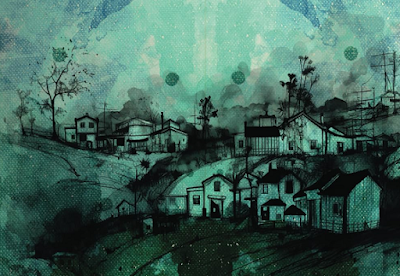
Read the full review by Radosveta Vassilevaon the New Eastern Europe website.
New Eastern Europe is the exclusive bimonthly news magazine dedicated to Central and Eastern European affairs published by the Jan Nowak-Jeziorański College of Eastern Europe in Wrocław, a Polish-based NGO think tank.
October 28, 2024
"Insightful, culturally rich blend of short stories"
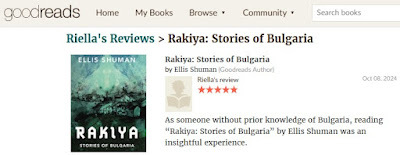
As someone without prior knowledge of Bulgaria, reading “Rakiya: Stories of Bulgaria” by Ellis Shuman was an insightful experience.
Rakiya, an eponymous chapter, is the first story in this collection of twelve short stories. It begins with an intensity that drives home the importance of Rakiya, especially when homemade, in Bulgarian culture. Unsurprisingly, Rakiya, the alcoholic drink, features throughout the book and is often lauded for its powerful taste and ability to enrich festive celebrations. However, the book delves into many other aspects of Bulgaria’s rich culture beyond the love for Rakiya. These aspects encompass its architecture, tourist attractions, favorable climate for startups, perseverance, hospitality, dark Second World War history, etc.The first story explains how Rakiya is made while highlighting the importance of communication in preserving and restoring relationships. The second story, “Mother and Daughter,” as well as “The Volcano,” “Sozopol,” and “Forgiveness,” the third, fifth, and eleventh stories, call for introspection. These stories, in particular, present flawed characters doing their best to survive, provide for their loved ones, and acknowledge their mistakes. While it is easy to condemn certain actions they take in this bid to survive, such as pickpocketing, cowardice, and poor judgment, it is undeniable that there is a need for readers to consider what they would do if they were in the exact shoes of these characters during the temporal setting of each story.
Initially, the stories seem to end with the conclusion of each chapter, which can be rather abrupt, leaving the gap of ”What next?”. As the book progresses, however, the interconnectivity of each story unfolds beautifully and surprisingly. It is a pleasant surprise when a character who had a brief and mysterious appearance reappears in another story, shedding more light on his/her role in the earlier story, such as in “The Baker” (the seventh story). The baker helps the mother and her daughter in the second story, but readers only come to understand his character in this seventh story. He is Syrian, but due to the raging war between his country and Israel, he finds himself sheltering in Bulgaria with his family. During this seventh story, he has a brief encounter with an Israeli customer, whose perspective on this encounter isn’t revealed until the twelfth story.
The book’s physical setting revolves around Bulgaria, allowing readers to explore its capital, Sofia, as well as a few other locations like Sozopol, the Rhodope Mountains, and Varna while offering insight into Israeli and Syrian culture through dialogue and reflections from characters.
Indeed, the prose is detailed in drawing to the fore the richness of Bulgaria’s culture through vivid descriptions, such as:
“The squarish structure sat on a foundation of black-and-white striped arches; five golden domes above sparkled in the sunlight. The church’s remarkable architectural style, ornamental in nature, seemed to date not only to another century, but to another mindset as well. I stood in silent reverence, as awestruck as the devout pilgrims. Serenity. Tranquility. Holiness. I wasn’t a religious person, but here I felt something very spiritual.” (Pages 126-127).
“As you may know, in Bulgaria, our religion is Eastern Orthodox Christianity. The monastery is what kept the Bulgarian spirit alive through the centuries of Ottoman rule. During our oppression, the monks safeguarded our language, our culture, our history, even our alphabet. We may not be a religious country today, but Bulgarians regard the Rila Monastery as our most sacred site.” (Page 127).
“Rakiya: Stories of Bulgaria” by Ellis Shuman is an insightful, culturally rich blend of short stories, ranging from humorous to creepy to somber. If you enjoy learning about cultures and history and prefer a diverse mix of characters, then “Rakiya” is definitely worth the read. I particularly enjoyed “Sozopol” because I was pleasantly surprised by its conclusion.
Review posted on Goodreads.
October 18, 2024
Review of ‘Saving Abigail’ by Liz Hirsh Naftali
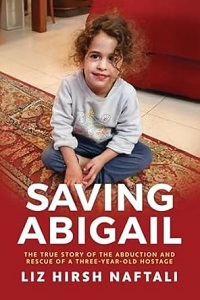 When Hamas attacked Israel in the early morning hours ofOctober 7, 2023, one of the hardest hit communities was Kibbutz Kfar Aza. NukhbaForce terrorists smashed through the border fence and launched a murderousrampage, going from house to house and killing, raping, and abducting civilians.Smadar and Roee Mor Idan were murdered in their home. Two of their children survivedthe attack by hiding inside a closet for 14 hours. Three-year-old Abigail wastaken hostage by Hamas.
When Hamas attacked Israel in the early morning hours ofOctober 7, 2023, one of the hardest hit communities was Kibbutz Kfar Aza. NukhbaForce terrorists smashed through the border fence and launched a murderousrampage, going from house to house and killing, raping, and abducting civilians.Smadar and Roee Mor Idan were murdered in their home. Two of their children survivedthe attack by hiding inside a closet for 14 hours. Three-year-old Abigail wastaken hostage by Hamas.Spoiler alert: Abigail, the youngest U.S. citizen held byHamas, was released in November, after 51 days of captivity in Gaza. Anotherspoiler alert: As of this writing, 97 hostages remain in Gaza, including thebodies of at least 34 confirmed dead by the IDF.
Saving Abigail: The True Story of the Abduction andRescue of a Three-Year-Old Hostage by Liz Hirsh Naftali (Post HillPress, September 9, 2024) details the author’s efforts, alongside others, torescue Abigail and free the remaining hostages.
Hirsh Naftali, Abigail’s great aunt, happened to be in thecountry on that tragic October morning. The losses in her family hit hard, butshe quickly realized there was something she could do. “I could tell peoplewhat had happened. I could let people know what Hamas had done to my family inKfar Aza, and to the entire country,” she writes in the book.
With no prior knowledge or plan how to rescue a hostage fromcaptivity, she set out to share her niece’s face and story, to not only bringawareness of the hostages’ plight, but to encourage American politicians andworld leaders to increase diplomatic pressure on Hamas to release theirprisoners.
“Practically speaking, I had no idea how to move the entireAmerican federal government in the midst of an unprecedented geopoliticalmess,” she writes. But “America still cared about its people, and when itfocused its full powers towards a specific objective, it could make big thingshappen.”
Hirsh Naftali had an advantage over others who lost familymembers on October 7th. She had connections with leading Americanpoliticians, many of whom she seemingly had on speed dial. She began callingand meeting with congressional and world leaders, including President JoeBiden.
The extensive name dropping on the pages of the book can beoverwhelming, especially to those unfamiliar with American politics. However,with all her connections, Hirsh Naftali could not guarantee Abigail’s release.
“Freeing Abigail seemed an insanely ambitious goal most ofthe time,” Hirsh Naftali writes. “She was part of events far bigger than thekidnapping and captivity of one tiny three-year-old child.”
Abigail was among the group of hostages released back toIsrael during a temporary truce. The second half of the book details theauthor’s continued advocacy for the release of the other hostages. While theyremain captive in Gaza at this time, it is important to know that there arethose who fight for their release every day, and this book’s author is one ofthem.
Liz Hirsh Naftali is an investor,philanthropist, and the host and creator of The Capitol CoffeeConnection podcast. She is the mother of five children and has livedbetween Israel and the US since 1992.
Originally posted on The Times of Israel.
October 14, 2024
Meet the Author Podcast
In September 2024, I had the opportunity to speak about my life, my writing, and my books with Rob & Joan from the Meet the Author Podcast.
You're invited to listen in!
October 8, 2024
Don't Judge a Book by Its (Tablet) Cover
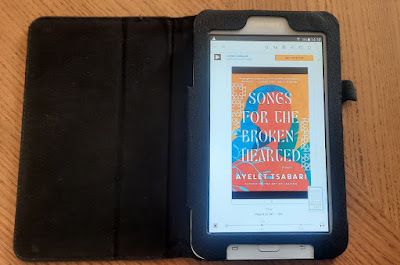
At 6:30 in the morningon Wednesday, September 25th, sirens went off, warning of an impending rocketattack on Tel Aviv. Along with the other passengers on the train that haddeparted from Modi’in half an hour earlier, I lay on the floor. The train slowedas it neared the Tel Aviv University Station. When it came to a stop, I rushedoff and took shelter in the arrival hall below the tracks.
It was the first timethat a missile fired by Hezbollah came close to striking Tel Aviv in theongoing and escalating conflict. The IDF Army confirmed it had intercepted thesurface-to-surface missile after it was launched from Lebanon. There were noreports of casualties or damage.
I breathed a sigh ofrelief and hurried toward the station’s exit. As I walked, I adjusted mybackpack and found that one of the pouches was unzipped. I felt inside anddiscovered that my tablet was missing. Maybe in my rush to get off the train Ihad placed it inside another pouch? Had I had left it on the train?
I need my tablet toread
My journey to work onthe early morning train lasts 37 minutes, and I utilize the time to read. Thatmorning, I had been just a chapter or two short of finishing Songs for the Brokenhearted by Ayelet Tsabari, an excellent novel by a highly talentedwriter. I was thoroughly enjoying the book and planning to write a verycomplimentary review. But when I arrived at my office and checked my backpack,I confirmed the fact that I had lost my tablet.
I opened a ticket onthe Israel Railways website reporting the loss. I joined several Facebookgroups—Lost and Found, Lost and Found in Tel Aviv, and Lost and Found on theTrain. I posted a quick note about losing my tablet and provided a briefdescription. I checked my Facebook feed every hour to see ifanyone reported finding it.
A few words about mytablet. It is a very old, outdated Samsung model, dating back to 2013. I onlyuse the tablet for reading. I don’t watch videos on the tablet; I don’t playgames. My tablet serves me solely as a digital book.
The mostdistinguishing feature of the tablet is its black cover. The cover is as old asthe device and shows extensive signs of wear and tear. It’s faded and startingto come apart. Unfortunately, I didn’t have a picture of the tablet to post onFacebook.
One of the firstthoughts that went through my head was how would I finish the last pages ofTsabari’s novel? I downloaded the Kindle app to my phone and on my return trainjourney home, I read the ending of the book on a very smallscreen.
I order a newtablet and then…
A week and a halfpassed, and I had given up hope of ever seeing my tablet again. I went onlineand searched for a new tablet to buy. I didn’t want anything fancy, and Icertainly didn’t want an Amazon Kindle, a device that continues to frustrate mywife months after she purchased it. I found an affordable model and made theorder. The tablet would be ready for pickup at an electronics store down thestreet from my office the very next day.
And then I got a phonecall from Israel Railways.
“Do you have a whitetablet?” someone asked me.
I didn't know the color! I couldn't remember ever seeing the tablet without its fraying cover.
“Does it have a startbutton at the bottom, like an iPhone 4?”
“I don’t know what aniPhone 4 looks like,” I admitted.
Don't judge a digitalbook by its cover
After work, I went tothe Lost and Found department at the Savidor Center Train Station. The clerkcouldn’t find a record of having called me that morning, but he did have myreport of a missing tablet listed in his files. “Is this one yours?” he said, holdingup a huge device.
“My tablet issmaller.”
“What about this one?”
“No, mine is muchsmaller”
“And this?”
I immediatelyrecognized the tablet by its old black cover. “That’s it!”
As the clerk wrote uphis report, I turned on the device. Amazingly, after having gone missing for aweek and a half, the battery was at 75%. And the Kindle app opened to the exactpage in Songs for the Brokenhearted that I had been reading when thesiren went off.
“You seem surprised,”the clerk said.
“I can’t believe thatI found it.”
“There are good peoplein this world,” the clerk said, referring to the honest anonymous trainpassenger who had turned my tablet into Lost and Found. “And your tablet is avery old model that no one uses anymore.”
No one uses? My tablet had just survived a missile attack and reappeared after disappearing for a week and a half! Even after all these years, it is still a suitable device for reading, especially when it comes to excellent novels like Songsfor the Brokenhearted by Ayelet Tsabari.
# # #
The True Story of How I Finished Reading Ayelet Tsabari’s New Novel

At 6:30 in the morningon Wednesday, September 25th, sirens went off, warning of an impending rocketattack on Tel Aviv. Along with the other passengers on the train that haddeparted from Modi’in half an hour earlier, I lay on the floor. The train slowedas it neared the Tel Aviv University Station. When it came to a stop, I rushedoff and took shelter in the arrival hall below the tracks.
It was the first timethat a missile fired by Hezbollah came close to striking Tel Aviv in theongoing and escalating conflict. The IDF Army confirmed it had intercepted thesurface-to-surface missile after it was launched from Lebanon. There were noreports of casualties or damage.
I breathed a sigh ofrelief and hurried toward the station’s exit. As I walked, I adjusted mybackpack and found that one of the pouches was unzipped. I felt inside anddiscovered that my tablet was missing. Maybe in my rush to get off the train Ihad placed it inside another pouch? Had I had left it on the train?
I need my tablet toread
My journey to work onthe early morning train lasts 37 minutes, and I utilize the time to read. Thatmorning, I had been just a chapter or two short of finishing Songs for the Brokenhearted by Ayelet Tsabari, an excellent novel by a highly talentedwriter. I was thoroughly enjoying the book and planning to write a verycomplimentary review. But when I arrived at my office and checked my backpack,I confirmed the fact that I had lost my tablet.
I opened a ticket onthe Israel Railways website reporting the loss. I joined several Facebookgroups—Lost and Found, Lost and Found in Tel Aviv, and Lost and Found on theTrain. I posted a quick note about losing my tablet and provided a briefdescription. I checked my Facebook feed every hour to see ifanyone reported finding it.
A few words about mytablet. It is a very old, outdated Samsung model, dating back to 2013. I onlyuse the tablet for reading. I don’t watch videos on the tablet; I don’t playgames. My tablet serves me solely as a digital book.
The mostdistinguishing feature of the tablet is its black cover. The cover is as old asthe device and shows extensive signs of wear and tear. It’s faded and startingto come apart. Unfortunately, I didn’t have a picture of the tablet to post onFacebook.
One of the firstthoughts that went through my head was how would I finish the last pages ofTsabari’s novel? I downloaded the Kindle app to my phone and on my return trainjourney home, I read the ending of the book on a very smallscreen.
I order a newtablet and then…
A week and a halfpassed, and I had given up hope of ever seeing my tablet again. I went onlineand searched for a new tablet to buy. I didn’t want anything fancy, and Icertainly didn’t want an Amazon Kindle, a device that continues to frustrate mywife months after she purchased it. I found an affordable model and made theorder. The tablet would be ready for pickup at an electronics store down thestreet from my office the very next day.
And then I got a phonecall from Israel Railways.
“Do you have a whitetablet?” someone asked me.
I didn't know the color! I couldn't remember ever seeing the tablet without its fraying cover.
“Does it have a startbutton at the bottom, like an iPhone 4?”
“I don’t know what aniPhone 4 looks like,” I admitted.
Judge a digitalbook by its cover
After work, I went tothe Lost and Found department at the Savidor Center Train Station. The clerkcouldn’t find a record of having called me that morning, but he did have myreport of a missing tablet listed in his files. “Is this one yours?” he said, holdingup a huge device.
“My tablet issmaller.”
“What about this one?”
“No, mine is muchsmaller”
“And this?”
I immediatelyrecognized the tablet by its old black cover. “That’s it!”
As the clerk wrote uphis report, I turned on the device. Amazingly, after having gone missing for aweek and a half, the battery was at 75%. And the Kindle app opened to the exactpage in Songs for the Brokenhearted that I had been reading when thesiren went off.
“You seem surprised,”the clerk said.
“I can’t believe thatI found it.”
“There are good peoplein this world,” the clerk said, referring to the honest anonymous trainpassenger who had turned my tablet into Lost and Found. “And your tablet is avery old model that no one uses anymore.”
No one uses? My tablet had just survived a missile attack and reappeared after disappearing for a week and a half! Even after all these years, it is still a suitable device for reading, especially when it comes to excellent novels like Songsfor the Brokenhearted by Ayelet Tsabari.
# # #
October 3, 2024
Review of 'Songs for the Brokenhearted' by Ayelet Tsabari
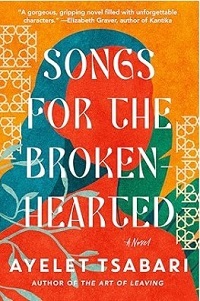 If there’s a soundtrack to
Songs for the Brokenhearted
by Ayelet Tsabari (Random House, September 10, 2024), it probably soundsvery much like Ofra Haza's ‘Yemenite Songs’ album. Like the album, thisoutstanding novel is a stage for Yemenite women sharing the traditional,sinuous tunes of a culture where singing is a day-to-day activity.
If there’s a soundtrack to
Songs for the Brokenhearted
by Ayelet Tsabari (Random House, September 10, 2024), it probably soundsvery much like Ofra Haza's ‘Yemenite Songs’ album. Like the album, thisoutstanding novel is a stage for Yemenite women sharing the traditional,sinuous tunes of a culture where singing is a day-to-day activity.“You know how it is with Yemeni people. Singing is in ourblood,” says one of the characters in the book. “We sing when we clean, we singwhen we cook. We sing when we’re happy. We sing when we’re sad. Incelebrations. Even in death.”
It is a death that brings Zohara, a 31-year-old PhDcandidate, back to Israel. Zohara’s mother, Saida, has died. The two hadn’talways gotten along. ‘Only after I moved to New York had we reached a quiet,dignified truce,’ Zohara tells herself. ‘I finally made it home again. and shewasn’t here.’
Along with her sister Lizzie, Zohara sets out to purchase agravestone and pack up their mother’s home in the Sha’ariya Yemini neighborhoodof Petach Tikva. At the grocery store down the street, Zohara meets Nir, withwhom she went to elementary school. Nir’s mother, Yael, introduces her to thesisterhood of women who gather at the community center to sing. As women traditionallyplay secondary roles in Yemeni households, Zohara ‘started thinking of thewomen’s songs, that insistence to be heard, as subversive, audacious, feministeven. I liked the idea of the women using their creative expression as a formof protest.’
When she discovers a set of old cassette tapes, the music 'bringsZohara closer to her mother, to understand her more after she died than she didwhen she was alive.' ‘It made me see my mother in a whole new light.’ Zohara isshocked to learn that her mother not only sang but was also a talented poetess.A woman capable of writing explicit lyrics.
‘If I were grapes strung on a vine, I’d squeeze the fleshof my fruit and pour juice into your mouth’.
At its heart of Songs for the Brokenhearted isa love story. It is the tale of Saida and Yaqub, who first met in an immigrantcamp in 1950, shortly after their arrival in Israel. “My heart is full ofrain. If it bursts, it might flood the whole time,” Saida sings, and theyoung girl's beautiful voice captivates Yaqub. “Singing is the one thing thatkeeps me sane in this place,” she tells him. “I miss the way we sang in Yemen,all the women together.”
Zohara’s discovery of her mother’s musical talents makes herreconsider the subject of her dissertation. She also reexamines her connectionwith Iggy, a former lover and her current best friend. Or maybe her friendshipwith Nir can advance to the next level, she wonders.
Tsabari, author of the award-winning The Best Place onEarth short story collection, populates her pages with true to lifecharacters. Zohara’s nephew, Yoni, struggles to find meaning during thepolitically charged weeks leading up to November 1995. Lizzie’s frustrationswith her sister are easily understood, and readers will readily connect withZohara, as she is drawn closer to her mother and learns more about herself inthe process.
You can almost hear Saida singing her original lyrics totraditional Yemenite songs as you read this moving, highly recommended novel.
Ayelet Tsabari’s debut collection of shortstories, The Best Place on Earth, won the Sami Rohr Prize forJewish Literature and the Edward Lewis Wallant Award. Her memoir The Art ofLeaving was a finalist for the Writer’s Trust Hilary Weston Prize, and the winnerof the Canadian Jewish Literary Award for memoir. She’s the co-editor of theanthology Tongues: On Longing and Belonging Through Language and has taughtcreative writing at Guelph MFA in Creative Writing and The University of King’sCollege MFA.
Originally posted on The Times of Israel.
Related articles:
Review of'The Art of Leaving' by Ayelet Tsabari
Review of'The Best Place on Earth' by Ayelet Tsabari
September 29, 2024
"Back From the War" - short story

One hundred days after the war began, Roni returnedto the office for the first time. Much had changed since the beginning ofOctober—there was a new office manager, the coffee machine had been replaced,and a fancy contraption dispensed freshly squeezed orange juice in thekitchen—but overall, things were just the same. The projects waiting for him werethose he had dropped when unexpectedly he was called up for emergency reserveduty, and although his inbox was now bloated with unread emails, it was as ifhe had never left.
“Roni, welcome back!” Gideon exclaimed,slapping him on his shoulder—a shoulder that ached from having carried a weaponnearly twenty-four hours a day. Gideon sat at the desk across from Roni in thedevelopers’ open space. “How are you doing, my brother?”
“I’m okay,” Roni said, swiveling his chair intoposition. He pushed aside the welcome-back gift basket, with its “Thank you foryour service!” note, expensive bottle of wine, and imported chocolate, and adjustedhis computer screen.
“No, really, how are you doing?”
How was he doing? How was anyone doing? He waslying when he said he was okay, but he didn’t want to say anything more. Not toGideon, whom he rarely saw outside work hours. Not to his boss, Moishe, either,or any of his colleagues. He hadn’t spoken with his parents about what he wentthrough, when he’d visited them the previous Shabbat, so why should he open upnow?
Read the rest of the story on The Jewish Fiction Journal.



